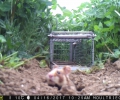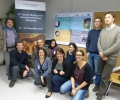“In Switzerland, we don’t have any hamsters, but we’ve got loads of ideas”
15 juin 2016About thirty Alsatian farmers participated in an educational trip to our Swiss neighbours, which took place on 19 and 20 May in the LIFE Alister framework. In Switzerland, where environmental protection is one of the priorities of the federal State, subventions granted to farmers to help them put in place an environmentally friendly crop management have helped conservation farming to grow sharply in several Swiss townships. This was a great opportunity for French farmers to discuss with their Swiss counterparts who have had many years of experience and to compare techniques studied with them in the framework of the LIFE Alister project.
Participants, farmers with land on the ZPS* Hamster parcels, as well as high-school students from the Obernai General and Agricultural Techniques Lycée, visited three sites.
In Zollikofen, in the Berne township, Wolfgang Sturny presented results of the Inforama Rütti trial platform. Farmers were able to hear about methods that had over 20 years of experience in various crops (barley, wheat, maize, beets, faba beans etc.), as well as discovering technical itineraries which used labour as well as direct sowing without any soil cultivation. Crops are farmed extensively, with the main goal of reducing production costs and the use of farm inputs, as well as limiting the use of phytosanitary products.
In the Vaud township, Edouard Cholley (who knows a lot about the LIFE Alister programme as he was a speaker), and Félix Meyer, advisors at Proconseil, as well as Pascal Agassis and Christian Streit, both farmers, presented the results of trials with direct sowing of grain crops and rapeseed, which can or cannot be associated with clover. Trials carried out on beets that were sowed using a strip-till opened new horizons for Alsatian farmers in the Hamster ZPS*, as they also grow beets. Up until now, strip-tills in the framework of the LIFE Alister Life Project, were only used when sowing maize.
The second day was devoted to intermediate cultures. Nicolas Courtois, an agronomist from AgriGenève, presented the results of trials lasting over six years in the Geneva township. “Intelligent” multiple species of intermediate culture vegetation cover (CIPAN*) follow one another in summer and winter to ensure crops or ground cover… and this without labouring the ground, which promotes biological activity and earthworms which stir and plough through the soil as efficiently as a tiller. These very promising techniques are slotted in the programme for upcoming trials in the LIFE Alister project.
Discussions also took place about growing wheat and rapeseed in association with various vegetation covers (purple or white clover, hairy vetch and buckwheat) as well as how to underseed clover in wheat tested on some experimental Alister plots.
To conclude, these two days were the occasion to learn and to share experiences. This was the opportunity for Alsatian farmers and farmers to be to be confronted with agriculture that is several years ahead of us in the use and experimentation of conservation farming. It also allowed us to validate the interest of several technical itineraries recommended in the framework of LIFE Alister and was even a source of inspiration to imagine new practices that promote both biodiversity and the European Hamster! Now it’s up to us to use all of this knowledge and to adapt it to Alsace’s dryer climate!
* Special Protection Zone
* Nitrate-fixing intermediate crops

![20160520 Voyage Suisse ALiSTER PO_[1] - copie](http://www.grand-hamster-alsace.eu/wp-content/uploads/sites/9/2016/05/20160520-Voyage-Suisse-ALiSTER-PO_1-copie-1024x486.jpg)


